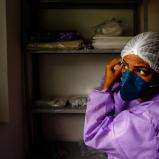Over the past year, Doctors Without Borders/Médecins Sans Frontières (MSF) has responded to the unprecedented threats posed by COVID-19 across all our projects. We also see how the pandemic can compound existing problems, trigger new crises, and overshadow other humanitarian needs.
For this special edition of Alert, we highlight some of the world's forgotten emergencies—forgotten by many in the international community but certainly not by our teams on the ground. In this photo essay, we bear witness to suffering, survival, and extraordinary strength during a tumultuous year.
Mexico: Stranded and at risk

MSF teams provide medical and psychological care to people all along the migration route through Mexico. Increasingly harsh migration policies imposed by the United States and Mexico have left many migrants and refugees stranded in makeshift settlements and overcrowded shelters. People on the move face threats to their health and safety, now exacerbated by COVID-19.
Libya: Nowhere to go but the sea

Mouliom Souleman and his family were taken aboard a search and rescue ship run by MSF in partnership with Sea-Watch on August 23. Originally from Cameroon, Souleman fled Libya in search of safety in Europe. Souleman wrote that on the day of the rescue, “I found a smile again. That is after more than three years of torture, forced labor, sleepless nights…. Libya for me is hell on earth.”
Greece: Trapped in despair

In September, a series of fires destroyed Moria refugee camp on the island of Lesbos, leaving some 12,000 people with no safe place to stay in the middle of a COVID-19 outbreak. MSF provides medical and mental health care to tens of thousands of refugees and asylum seekers trapped on the Greek islands. We are calling on European leaders to evacuate vulnerable people and end harmful migration policies.
Lebanon: After the explosion
After the deadly explosion in Beirut this August, MSF teams carried out door-to-door visits in Karantina—a crowded neighborhood that was once a quarantine area for immigrants and refugees arriving by sea. We provided wound care and mental health care for people affected by the disaster, as well as continuity of care for people with chronic diseases.
The MSF Goyalmara Mother and Child hospital is a specialized facility in Cox’s Bazar district, now home to nearly 900,000 Rohingya refugees forced to flee Myanmar. Staff have created a mural featuring the footprints of babies discharged after treatment at the hospital. Three years after the Rohingya exodus, MSF teams manage 10 hospitals and primary health centers here in the world’s largest refugee settlement.
Syria: Uprooted by endless conflict

MSF distributes essential items, including blankets and hygiene kits, at a camp for internally displaced people in Idlib, in northwestern Syria. MSF has also distributed more than 300 tons of heating materials to people living in 21 camps and settlements across the region. A military offensive by the Syrian government and its allies uprooted almost a million people in the Idlib region between December 2019 and March 2020.
Yemen: Cascading emergencies

Workers at the Al-Sahul COVID-19 treatment center in Ibb governorate carry an oxygen cylinder to the intensive care unit. Patients with moderate to severe symptoms of COVID-19 need about six oxygen cylinders a day—and maintaining adequate supplies in this war-torn country is a major challenge.

The MSF health promotion team in Ibb trains health workers and conducts regular awareness sessions with local communities about how to protect vulnerable family members from COVID-19.
Cameroon: Spiraling crisis

In February—just a few weeks before this photograph was taken—Felix and his family were attacked by armed men amid the spiraling conflict in the northwestern region. An assailant cut off his left hand with a knife. “I lay bleeding on the ground for two hours before my sister dared to come back for me,” said Felix, age 23. “We hid in the forest for two weeks.” He was eventually brought to the MSF-supported Saint Mary Soledad Hospital, where he was treated for his physical wounds and for psychological trauma.
Burkina Faso: Violence spreads

MSF teams distribute essential household items to displaced families living in Silmangué. The world's fastest-growing humanitarian crisis is unfolding in this country, where escalating violence has forced more than one million people to flee their homes.

At a health center in Bouroum department, an MSF nurse checks a patient’s vital signs and does a rapid diagnostic test for malaria. MSF provides primary health care to people at community outposts and dispatches mobile clinics to serve people in remote areas.
South Sudan: Devastating floods

People collect water from MSF’s surface water treatment center in Pibor town, where severe flooding has displaced thousands of people and deepened an already complex emergency in the region. MSF has been providing over 60,000 liters of drinking water per day here after boreholes were contaminated by floodwaters. Teams are also responding to a rise in measles and malaria cases, increased fighting, and high levels of food insecurity.

An MSF medic examines a child at our inpatient unit in Pibor town. MSF has relaunched an emergency intervention here, opening a clinic in the only place that did not get flooded during last year’s rainy season.
Measles: A silent killer in parts of Africa

An MSF team travels by dugout canoe around Tassakane, in Mali's Timbuktu region, as part of a major vaccination campaign against measles.

Teams are working with the Ministry of Health in Mali to vaccinate 95 percent of children between 6 months and 14 years old. Here, a classroom in Tassakane becomes a vaccination site.

MSF launched an emergency intervention in Central African Republic in response to a nationwide measles epidemic. Teams helped vaccinate more than 340,000 children against the disease, despite huge logistical challenges and security constraints.








